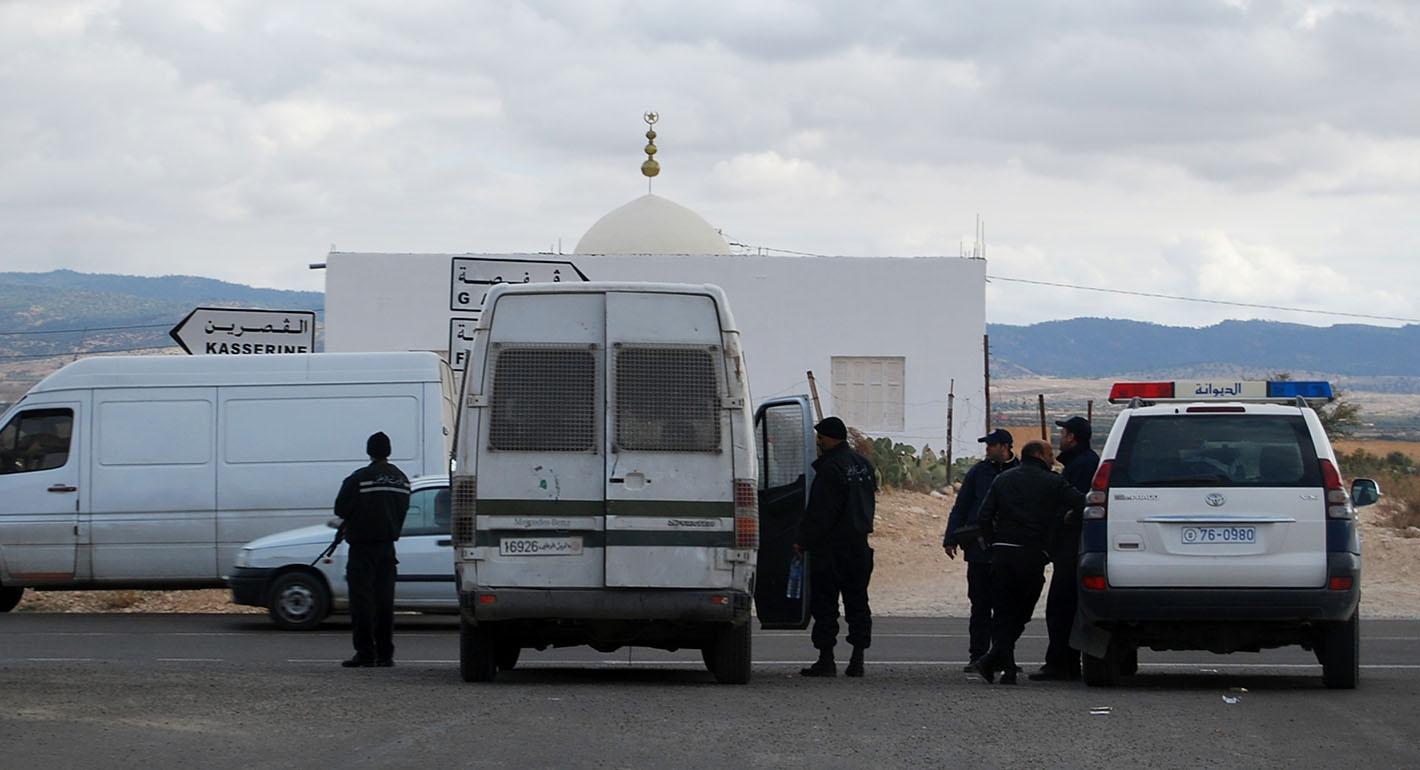Having failed to build a team that he can fully trust or establish strong state institutions, Mirziyoyev has become reliant on his family.
Galiya Ibragimova

Source: Getty
Women are increasingly joining the male-dominated world of smuggling. Could this be the start of a cultural revolution that challenges long-held gender norms?
In recent years, women in particular have carved out a niche in this illegal trade. This may come as a surprise, given the prevailing gender norms in Algeria. Women make up approximately 49 percent of the population, yet a mere 15 percent participate in the labor force. According to the “Global Gender Gap Report 2020,” Algeria ranks an abysmal 132 out of 153 countries when it comes to gender parity.
But to supplement their families’ meager incomes, stay-at-home mothers, widows, and even single women are increasingly joining the historically male-dominated world of smuggling. For underemployed men and women in Algeria’s neglected northeastern borderlands, smuggling is a localized solution to a local problem—largely borne from profound socioeconomic disparities and a severe shortage of employment opportunities and public investment.But unsurprisingly, women’s experience with smuggling differs from that of their male counterparts. Women’s choice of goods, routes, and methods largely reflects their traditional role in society. Indeed, their choices remain intricately linked to male perceptions of acceptable female behavior.
Yet, in this case, these perceptions give women an advantage over men in their dealings with officialdom. While also at the mercy of border security, women can play on men’s respect for mothers, daughters, and wives and push the notion that, in order to make ends meet, smuggling is their only option. Women’s success in this regard has served to empower them and improve their status within their families and communities—even though traditional gender norms remain.
Although media reports have highlighted at least one instance of a woman smuggling gasoline, most women are exclusively handling items associated with their gender: cosmetics, perfume, serving dishes, cooking tools, kitchen accessories, fabrics, and household linen. This specialization helps them avoid competition with the men.
Women purchase these goods at wholesale as well as from retail markets situated in urban or urban-adjacent areas in Algeria’s northeast. The most important market, known as Souq Dubai, islocated in the city of El Eulma.1 Other markets of note include Aïn Fakroun and Aïn M’lila in the city of Oum El Bouaghi.These three markets all took root just beyond major urban centers during a period of economic liberalization in the 1990s, and the markets have grown in the 2000s to become the most important in the country.
Once a woman smuggler has amassed the desired quantity of goods, she sets off with a hired driver for Tunisia. Small-scale smugglers save time and money by heading to markets in the nearby towns of Kasserine or Gafsa—which lie just over the border in west-central Tunisia. This means they do not have to stay in Tunisia overnight—something especially important to those women with domestic and childcare responsibilities. In the words of one smuggler, “Once my cab is booked, I cross the border and come back the same day.” She added, “I rarely sleep there; I have family there, but I prefer to go back the same day because I have children and it is my mother who takes care of them during my trip.”2
With more and more women engaging in smuggling, competition among them is increasing. As a result, some choose to bypass markets and merchants in favor of selling their goods to an inner circle of family and friends in Kasserine and Gafsa. This involves door-to-door deliveries to customers who have placed their orders beforehand by phone. One practitioner of the trade in Bir El Ater described the situation this way:
Many of us have a connection on the other side of the border. I have two aunts, several cousins, and many friends in Tunisia. . . . I always take samples and pictures of what I bought in Souq Dubai and go to my cousin, who lives in Haïdra [located in Kasserine Governorate]. She invites other female friends over, and around tea and coffee we discuss, laugh, and do business.3
Similar to men’s smuggling of gasoline and other goods, women’s smuggling is not as informal as it seems but rather organized and elaborate. Indeed, the strategies that women smugglers use show the complex interplay women have with state regulations and borderland officials. Like their male counterparts, women pay what they call “settlements,”4 or bribes, to several people throughout their smuggling operation: the driver, as he incurs a risk transporting the products; customs agents on both sides of the border, so that they turn a blind eye to the activity; and, if they have arranged a pickup, the unofficial porter who transports the goods from the car on the Algerian side of the border to a client waiting on the Tunisian side. Settlements with customs officials are negotiated ahead of time by phone. Together with the other settlements, they significantly slash the profit margin for women smugglers—the majority of whom have limited means.
A more substantial financial hit is sustained when the customs officer on duty is not the one who agreed to the settlement and has no prior working relationship with the woman smuggler. Having to negotiate on the spot usually means paying a higher settlement. Refusing to do so would result in the confiscation of a smuggler’s goods. To ensure that such complications do not prove ruinous, women smugglers generally “stay within the limit”5—by keeping the goods they transport to an undefined but unobtrusive amount (equal to “tourist luggage”) or by using several cars, though the latter increases transportation costs.
One factor working in a woman’s favor is that, unlike her male counterpart, she faces a lower risk of arrest. Women smugglers often accentuate the notion that they are respectable mothers or daughters who, because of circumstances beyond their control, have no choice but to pursue a trade that is normally the preserve of men. Husbands or other male relatives caution the drivers to protect and respect the women, as a principle of honor. Women’s Islamic attire, including the headscarf, helps to convey this intended message of respectability and piety. Algerian and Tunisian customs agents—many of whom are conservative—are typically reluctant to subject women and their possessions to searches considered unacceptably invasive.
As a result, unlike men, women do not need to travel to far-flung mountainous hamlets to unload their products or wait for specific times that customs agents have agreed to “open the stretch.”6 Instead, women can smuggle their goods through official border checkpoints at any time of the day and may freely enter Tunisian territory to conduct sales. More often than not, both countries’ border officials will outwardly accept the fiction that women smugglers are tourists and that their merchandise is no more than personal belongings.
Beyond highlighting the enduring economic plight of the borderlands, the emergence of women smugglers challenges long-held assumptions and unspoken rules. In the borderlands, a gender hierarchy dictates family relations. The man of the house often disapproves of his wife and daughters leaving home unaccompanied unless it is for a “suitable” reason—for example, shopping, visiting family, or attending religious or other ceremonies. Most married women have internalized this state of affairs. However, their successful economic activity has infused them with confidence, which, in turn, has enabled them to chip away at gender norms and the patriarchal structure.
Despite the varying frequency and magnitude of their operations, women smugglers tend to agree that their “business” has given them some agency and opened up new horizons.7 They have acquired skills and knowledge related to products, exchange rates, accounting, and relevant legal frameworks in both Algeria and Tunisia. They have become professionals, with many attaining financial independence. A forty-two-year-old smuggler and mother of four explained:
It is a space of freedom and discovery. I discovered that I had a real talent in negotiating things, and today I am proud. . . . The time when I used to wait for [my husband] to feed me and provide everything is over. . . . Today, I too feed the family, including him.8
Broadly speaking, women’s involvement in such a financially successful endeavor has served to temper social disapproval of women’s economic activity in general and small-scale trade in particular. Their earning of a decent wage is helping to alter the view that it is shameful for a woman to work and for her husband to subsist even in part on her earnings.9 After all, the material benefits of a husband and wife both performing paid work are visibly evident. Most women smugglers invest their earnings in the familial sphere—constructing, enhancing, and furnishing a house; contributing to school-related expenditures for their children; and organizing lavish wedding receptions for their grown sons and daughters.10
However, despite having a degree of leverage within the family unit, women smugglers still have to engage in an artful balancing act. They must defer to men at various stages of the smuggling operation. To begin with, it is generally a close male relative such as a husband, brother, or cousin who provides a woman with the funding to launch her career as a smuggler. It is also a male relative who hires a dependable driver and teaches him the ways of the business.
Doubling as a fixer, the driver negotiates the settlement beforehand with a customs agent and hands the bribe to him when the time comes. And if a different agent turns up at the appointed time and decides to confiscate the smuggler’s merchandise, it is either the driver or the woman smuggler’s male kin who intercedes by phone or later in person to try to secure the items’ return.
Thus, even while conducting an illegal activity, women smugglers remain constrained by the cultural expectation that they maintain an unimpeachable reputation. In theory, they must avoid interaction with men to whom they are unrelated. This is why it falls on the driver to deal with border officials. Paradoxically, however, women smugglers tend to have particularly good relationships with their male drivers, as they often use the same one each time.
In Algeria, women’s participation in cross-border smuggling amounts to a slow-burning cultural revolution. Traditionally confined to homemaking, child-rearing, and caregiving, women of the borderlands have begun to take advantage of a business opportunity far beyond the domestic sphere. In doing so, they have pushed back against social customs, particularly those relating to gender roles. They have also empowered themselves by acquiring an independent source of income.
Yet this cultural revolution is paradoxical in nature. Even as they transcend the domestic sphere, women smugglers take care to restrict their dealings to items connected with that sphere. This reinforces women’s association with domestic affairs, yet enables them to avoid competing with, and ultimately antagonizing, male smugglers. Just as crucial to women smugglers’ success has been their ability to conduct operations with the collusion of border officials, thereby eluding legal repercussions.
It is also worth noting that the revolution is unlikely to have a significant effect on the skewed male-female ratio in the country’s formal economy. For all their achievements in the murky world of illegal yet tolerated cross-border trade, entrepreneurial women who take up smuggling cannot redress that imbalance. Nothing short of state-sponsored change is required. In other words, to rectify matters, the Algerian government would have to launch a campaign to enhance legitimate economic opportunities for women, particularly in long-neglected regions such as the northeastern borderlands.

1 Souq Dubai consists of 3,249 stalls with 3,000 merchants.
2 Author interviews (two) with a small-scale smuggler of cosmetics and household products, M’Daourouche, Algeria, March and April 2019.
3 Author interview with a smuggler of linen and beauty products, Bir El Ater, Algeria, April 2019.
4 Several interviewees used the term “settlements” to describe the payment they make to customs officials.
5 Author interviews with several small-scale smugglers who used the same expression, M’Daourouche and Bir El Ater, Algeria, March and April 2019.
6 Author interview with a smuggler, M’Daourouche, Algeria, March 2019.
7 Author interviews with several smugglers, M’Daourouche and Bir El Ater, Algeria, March and April 2019.
8 Author interview with a small-scale smuggler, M’Daourouche, Algeria, March 2019.
9 Ibid.
10 A small minority of women have become wealthy by investing their profits in real estate.
Carnegie does not take institutional positions on public policy issues; the views represented herein are those of the author(s) and do not necessarily reflect the views of Carnegie, its staff, or its trustees.
Having failed to build a team that he can fully trust or establish strong state institutions, Mirziyoyev has become reliant on his family.

Galiya Ibragimova
A prophetic Romanian novel about a town at the mouth of the Danube carries a warning: Europe decays when it stops looking outward. In a world of increasing insularity, the EU should heed its warning.

Thomas de Waal
For a real example of political forces engaged in the militarization of society, the Russian leadership might consider looking closer to home.

James D.J. Brown
Supporters of democracy within and outside the continent should track these four patterns in the coming year.


Saskia Brechenmacher, Frances Z. Brown
The story of a has-been politician apparently caught red-handed is intersecting with the larger forces at work in the Ukrainian parliament.

Konstantin Skorkin